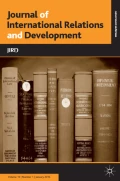Salient discourses in international society: When and how have United Nations global conferences acted as catalysts?
Abstract:
Salient discourses shape the way actors perceive and engage in global politics. How and to what extent terminology becomes salient in international society, however, is not well understood. This article investigates one potential source of discursive change: global conferences convened by the United Nations (UN). Conceptually, we combine insights from scholarship on discursive shifts with an emphasis on how salient terms become in a given venue and points in time, in order to better understand when and to what extent a discursive shift is sustained. Quantitative analysis of all speeches in the UN General Assembly (UNGA) General Debate between 1970 and 2020 robustly illustrates correspondence between UN global conferences and shifts in the salience of core terms by means of two independent indicators and interrupted time series analysis. We identify three significant discursive shifts following UN global conferences with wide and puzzling variation in their trajectories: sustainable development, social development, and gender (equality). To understand this variation, we qualitatively investigate scope conditions of discursive shifts and salience of these and several related terms. Our findings include that differences in terms’ versatility and formal institutionalisation correspond with their rise and fall in salience after global conferences.


